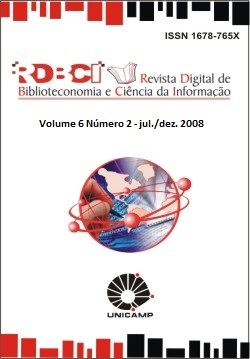Abstract
Networks are developed through the contacts established by its actors, provoke the social construction of the individual, and, when seen through its relations, can identify cohesions and similarities, in coadunated activities of individuals who act as a single social body. Studying information use within Universidade Estadual de Londrina (UEL) functional food’s network and its resources was the main goal of this work. The studied network is characterized by a group of researchers who seeks the development of this specialty – functional foods. Through Social Network Analysis’ (SNA) methodology, the central actors in the network and the informational resources used by such actors were identified. The results indicate that the use of information within the network occurs either in the formal scope and in the informal scope. The information resources, the link between information and network, provide information to the receptor, who needs it. In such network, the resources and information services are represented by Capes’ Periodicals Portal, Internet, libraries, and associations, which could be said, then, as the great facilitators of informational channels in the network.
References
AGUIAR, A.C. Informação e atividades de desenvolvimento científico, tecnológico e industrial: tipologia proposta com base em análise funcional. Ciência da Informação, Brasília, v.20, n.1, p.7-15, jan./jun. 1991.
ARAÚJO, E.A. de. Informação, sociedade e cidadania: gestão da informação no contexto de organizações não governamentais (ONGs) brasileiras. Ciência da Informação, Brasília, v.28, n.2, p.155-167, maio/ago. 1999.
BARRETO, A. de A. Mudança estrutural no fluxo do conhecimento: a comunicação eletrônica. Ciência da Informação, Brasília, v.27, n.2, p.122-127, maio/ago. 1998.
BARRETO, A. de A. A questão da informação. São Paulo em Perspectiva, São Paulo, v.8, n.4, p.3-8, out./dez. 1994.
BARRETO, A.R. et al. Manual de gestão de serviços de informação. Curitiba: TECPAR; Brasília: IBICT, 1997.
BORGATTI, S.P.; EVERETT, M.G.; FREEMAN, L.C. Ucinet for Windows: software for social network analysis. Harvard: Analytic Technologies, 2002. Disponível em: < http://www.analytictech.com> Acesso em: 28 abr. 2005.
BRASIL. Portaria n°398, de 30 de abril de 1999. Diário Oficial da União, Poder Executivo, Brasília, DF, 3 maio 1999.
CAMPELLO, B.S. Encontros científicos. In.: CAMPELLO, B.S.; CENDÓN, B.V.; KREMER, J.M.(Orgs.) Fontes de informação para pesquisadores e profissionais. Belo Horizonte: Ed. UFMG, 2003a. Cap.4, p.55-72.
CAMPELLO, B.S. Organizações como fonte de informação. In.: CAMPELLO, B.S.; CENDÓN, B.V.; KREMER, J.M.(Orgs.) Fontes de informação para pesquisadores e profissionais. Belo Horizonte: Ed. UFMG, 2003b. Cap.2, p.35-48.
CAMPELLO, B.S. Pesquisas em andamento. In.: CAMPELLO, B.S.; CENDÓN, B.V.; KREMER, J.M.(Orgs.) Fontes de informação para pesquisadores e profissionais. Belo Horizonte: Ed. UFMG, 2003c. Cap.3, p.49-54.
COSTA, L.; MARTINHO, C.; FECURI, J.(Coords.). Redes: uma introdução às dinâmicas da conectividade e da auto-organização. Brasília: WWF-Brasil, 2003.
DIAS, M.M.K. Normas técnicas. In.: CAMPELLO, B.S.; CENDÓN, B.V.; KREMER, J.M.(Orgs.) Fontes de informação para pesquisadores e profissionais. Belo Horizonte: Ed. UFMG, 2003. Cap.11, p.137-152.
FRANÇA, R.O. A patente. In.: CAMPELLO, B.S.; CENDÓN, B.V.; KREMER, J.M.(Orgs.) Fontes de informação para pesquisadores e profissionais. Belo Horizonte: Ed. UFMG, 2003. Cap.12, p.153-182.
FREEMAN, L.C. Centrality in social networks: conceptual clarification. Social Networks, Amsterdam, v.1, n.3, p.215-239, 1978/1979.
HANNEMAN, R.A. Introducción a los métodos del análisis de redes sociales. Riverside: Universidad de California, 2001. Disponível em: < http://revista-redes.rediris.es/webredes/> Acesso em: 20 fev. 2006.
HAYTHORNTHWAITE, C. Social network analysis: an approach and technique for the study of information exchange. Library & Information Science Research, Norwood, v.18, n.3, p.323-342, Autumn 1996.
KOSSINETS, G.; WATTS, D.J. Empirical analysis of an evolving social network. Science, New York, v.311, n.5757, p.88-90, 6 January 2006.
LESCA, H.; ALMEIDA, F.C. Administração estratégica da informação. Revista de Administração, São Paulo, v.29, n.3, p.66-75, jul./set. 1994.
MARTELETO, R.M. Análise de redes sociais – aplicação nos estudos de transferência da informação. Ciência da Informação, Brasília, v.30, n.1, p.71-81, jan./abr. 2001.
MATHEUS, R.F.; SILVA, A.B.O. e. Análise de redes sociais como método para a Ciência da Informação. DataGramaZero – Revista de Ciência da Informação, Rio de Janeiro, v.7, n.2, abr. 2006. Disponível em: < http://www.dgz.org.br/abr06/Art_03.htm> Acesso em: 27 abr. 2006.
MOLINA, J.L.; AGUILAR, C. Identidad étnica y redes personales entre jóvenes de Sarajevo. Revista Iberoamericana de Filosofía, Política y Humanidades, Barcelona, v.5, n.12, jul./dic. 2004.
MONTALLI, K.M.L.; CAMPELLO, B. dos S. Fontes de informação sobre companhias e produtos industriais: uma revisão de literatura. Ciência da Informação, Brasília, v.26, n.3, set./dez. 1997.
MUELLER, S.P.M. O periódico científico. In.: CAMPELLO, B.S.; CENDÓN, B.V.; KREMER, J.M.(Orgs.) Fontes de informação para pesquisadores e profissionais. Belo Horizonte: Ed. UFMG, 2003. Cap.5, p.73-96.
NONAKA, I.; TAKEUCHI, H. Criação de conhecimento na empresa: como as empresas japonesas geram a dinâmica da inovação. Rio de Janeiro: Campus, 1992.
OTTE, E.; ROUSSEAU, R. Social network analysis: a powerful strategy, also for the information sciences. Journal of Information Science, Cambridge, v.28, n.6, p.441-453, Dec. 2002.
PONJUÁN DANTE, G. Gestión de información: dimensiones e implementación para el éxito organizacional. Rosario: Nuevo Parhadigma, 2004.
TOMAÉL, M.I.; ALCARÁ, A.R.; DI CHIARA , I.G. Das redes sociais à inovação. Ciência da Informação, Brasília, v.34, n.2, maio/ago. 2005.
TOMAÉL, M.I. et al. Redes sociais e inteligência local: espaços da informação. In.: SEMINÁRIO LATINO-IBEROAMERICANO DE GESTIÓN TECNOLÓGICA, 11., 2005, Salvador. Anais... Salvador: ALTEC, 2005, p.1-14.
UGARTE, D. de. Analizando redes sociales. 2004. Disponível em: < http://www.lasindias.com/curso_redes/curso_redes_1.html> Acesso em: 18 fev. 2005.
WATTS, D.J. The “new” science of networks. Annual Review of Sociology, Palo Alto,
v.30, p.243-270, Aug. 2004.

This work is licensed under a Creative Commons Attribution 4.0 International License.
Copyright (c) 2008 Jorge Luis Rodrigues, Maria Inês Tomaél






